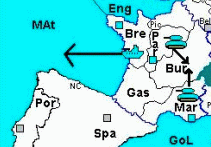The Panic Opening
A solid opening for France
By Dominik Panic
Editor's Note: This article was originally published December, 2002, on the German Diplomatic Pouch in it's native form, "Mit Frankreich solide eröffnen". Special thanks to Timo Müller for the English translation.
I got the idea for this article after I had read an article written by German FTF champion André Ilievics in a recent issue of the German Diplomatic Pouch. André discussed several openings for France, but unfortunately, he didn't include the opening that is in my opinion the strongest and most solid one. When I didn't even find a name for this opening in the Pouch's Openings Database, I decided to promote my personal favorite by writing this article.
The most important advantage is obvious. The opening is very safe, but you don't give away a single strategical opportunity. In Germany, there have been discussions why France did so badly in the German Championships although it is a strong country. One important reason, I think, is that France rarely choses to send an army to Burgundy in S'01. This would cause a severe argument with Germany, which you usually want to avoid. It is quite probable, however, that the German will take advantage of your timidness by sending his A Mun into Burgundy. This normally is the beginning of the end. And here lies the big advantage of the Burgundy bounce: Burgundy is safe in the first move, but you don't offend your German neighbor. In F'01, A Par can be employed in defending Brest, if England has sent a fleet into the Channel. Provided Italy hasn't moved into Piedmont - which rarely ever happens and can usually be avoided by diplomatic negotiations - France can conquer Iberia without any risk, secure its home centers, and have five centers after F'01, which is exactly the right number. The only considerable disadvantage is Belgium, in F'01. In my opinion, though, this isn't really a disadvantage. If France had six centers after the first year, the other players would probably form a "stop the leader" alliance. France has so many opportunities that the diplomatic advantage you get out of waiving Belgium is much more important. Besides, you won't have to decide whom of the Western powers you'll support in F'01, since you can't support anyone (into Belgium). Conversely, you can use the advantages of this opening to figure out your neighbors. For example, it isn't always necessary to tell Germany exactly how you'll move. Normally, it will suffice to agree with Germany on making Burgundy a DMZ. If your neighbor is a villain who wants to stab you by marching into Burgundy, he won't be successful thanks to the bounce of Mar and Par. In addition, you now know that you can't trust him. Germany will pay for the stab by not being able to send his army into Belgium in the fall. You, however, have kept your side of the bargain by not moving an army into Burgundy. In regards to England, you also can sit back and watch what the King will do. If he has sent his fleet into the Channel in spring, his attempt to capture Brest will fail because your A Par will bounce the attack. He will even have a second disadvantage: as neither unit has moved into Brest, you can build a second fleet. If the English fleet hasn't moved into the Channel, you'll be able to build a fleet in Brest anyway. Again: the advantage of this opening, in comparison with other defensive French openings such as the Maginot or Chris Warren's, "Iberian Gamit", is the flexible position you'll maintain. You don't offend Germany (as you do in the Maginot), but you aren't open to him either (as you are in the Iberian Gambit, which aims at building a second fleet for the war against England or Italy). You still have all the diplomatic opportunities you had before, you let Germany and England argue over Belgium, and when the time is right, you take the offensive.
|
|||
|
Dominik Panic ([email protected]) If you wish to e-mail feedback on this article to the author, click on the letter above. |



